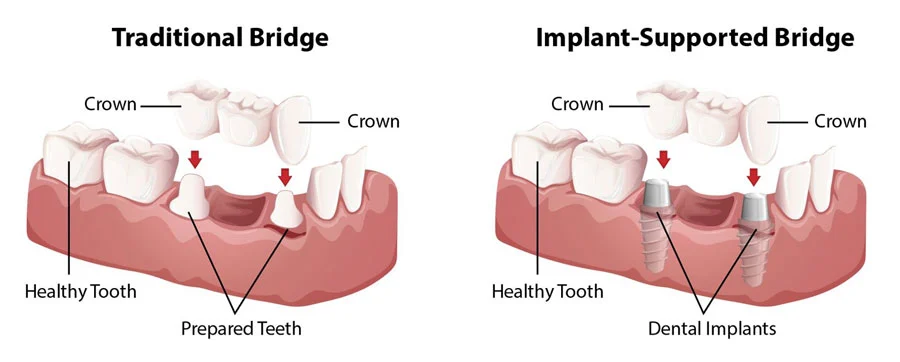As dentists, we often see patients who are missing teeth, and as a result, have difficulty chewing and speaking properly. The traditional method of replacing missing teeth has been through the use of dentures or bridges. However, these options have several drawbacks, including the need for regular adjustments, decreased functionality, and potential damage to adjacent teeth. In recent years, dental implants have become a popular and effective solution for missing teeth, and implant-supported crowns and bridges offer several advantages over traditional options. In this article, I will discuss the benefits of implant-supported crowns and bridges for my patients.
What are implant-supported crowns and bridges?
Implant-supported crowns and bridges are prosthetic teeth that are supported by dental implants. Dental implants are small titanium posts that are surgically placed into the jawbone to replace the roots of missing teeth. Once the implants have fused with the jawbone, abutments are attached to the implants, and prosthetic teeth are attached to the abutments. Implant-supported crowns and bridges are designed to look and function like natural teeth, and they provide a long-term solution for missing teeth.

What are the benefits?
Improved Aesthetics
One of the most significant benefits of implant-supported crowns and bridges is their ability to improve the aesthetics of the patient’s smile. Unlike traditional dentures, implant-supported crowns and bridges are custom-designed to match the patient’s natural teeth in size, shape, and color. This customization ensures that the prosthetic teeth blend seamlessly with the patient’s natural teeth, providing a natural-looking and aesthetically pleasing result.
Improved Functionality
Implant-supported crowns and bridges offer improved functionality over traditional dentures and bridges. The prosthetic teeth are anchored to the jawbone through the dental implants, which provide a stable and secure foundation. This stability allows patients to chew and speak with confidence, without worrying about their prosthetic teeth slipping or shifting. Additionally, because the prosthetic teeth are supported by implants rather than adjacent teeth, there is no risk of damage to the surrounding teeth.
Increased Longevity
Implant-supported crowns and bridges are designed to be a long-term solution for missing teeth. With proper care and maintenance, dental implants can last a lifetime. The prosthetic teeth attached to the implants are also designed to be durable and long-lasting. This longevity makes implant-supported crowns and bridges a cost-effective solution for missing teeth in the long run, compared to traditional options that may require frequent repairs or replacements.
Improved Oral Health
Implant-supported crowns and bridges can also improve oral health. When a tooth is lost, the jawbone begins to deteriorate, which can lead to further tooth loss and changes in facial structure. Dental implants mimic the function of natural tooth roots, stimulating the jawbone and preventing further bone loss. Additionally, because they do not rely on adjacent teeth for support, there is no risk of damage or decay to those teeth.
Improved Confidence
Missing teeth can have a significant impact on a person’s self-esteem and confidence. Implant-supported crowns and bridges can help to restore a patient’s confidence by providing a natural-looking solution for missing teeth. Patients no longer have to worry about their prosthetic teeth slipping or shifting. They can enjoy a full range of foods and activities without fear of embarrassment.

The Procedure for Implant-Supported Crowns and Bridges
The process for getting implant-supported crowns and bridges typically involves several steps:
- Consultation and Evaluation: The dentist will evaluate the patient’s oral health and determine if they are a good candidate for dental implants. This may involve taking x-rays and creating a treatment plan.
- Implant Placement: The dental implants are surgically placed into the jawbone by a trained oral surgeon or periodontist. The number of implants needed will depend on the number of missing teeth and the patient’s oral health.
- Healing and Integration: The jawbone will need time to heal and integrate with the implants. This process can take several months, during which time the patient may wear a temporary restoration.
- Abutment Placement: Once the implants have integrated with the jawbone, abutments are attached to the implants. The abutments will serve as the foundation for the prosthetic teeth.
- Prosthetic Placement: The final step is to attach the prosthetic teeth to the abutments. The prosthetic teeth are custom-designed to match the patient’s natural teeth, and the dentist will ensure a proper fit.
While the process for getting implant-supported crowns and bridges may take several months, the end result is a durable and long-lasting solution for missing teeth.
Caring for your Crowns and Bridges
Proper care and maintenance are essential for the longevity of implant-supported crowns and bridges. Patients should follow good oral hygiene practices, including brushing, flossing, and visiting their dentist for regular checkups and cleanings. Patients should also avoid biting down on hard objects, as this can damage the prosthetic teeth and implants.
In some cases, patients may need additional procedures to maintain the health of their implants, such as bone grafting or gum tissue regeneration. The dentist will evaluate the patient’s oral health and recommend any necessary procedures.
In conclusion, implant-supported crowns and bridges offer several benefits over traditional options for missing teeth. They provide improved aesthetics, functionality, longevity, oral health, and confidence for patients. While the process for getting these may take several months, the end result is a durable and long-lasting solution for missing teeth. Proper care is essential for the longevity of implant-supported crowns and bridges, and patients should follow good oral hygiene practices and visit their dentist regularly. As a dentist, I highly recommend these options in certain circumstances as a solution for my patients with missing teeth.

